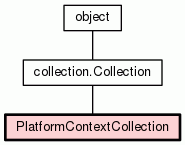
| Home | Trees | Indices | Help |
|
|---|
|
|

Platform context collection. Update is not supported. This collection will always contain at most one element. If the collection already contains a context, a newly created context will replace the old one.
| Instance Methods | |||
|
|||
|
|||
|
|||
|
Inherited from Inherited from Inherited from |
|||
| Properties | |
|
Inherited from |
| Method Details |
Creates an instance of collection. Note that
|
Instantiates a new platform context associated to a particular platform (that must be owned by the organization this host is owned by).
|
Creates remotely a new platform context associated to a particular platform (that must be owned by the organization this host is owned by). If a platform was already associated to the host, the association is lost and replaced by this one. |
| Home | Trees | Indices | Help |
|
|---|
| Generated by Epydoc 3.0.1 on Tue Dec 5 14:16:50 2017 | http://epydoc.sourceforge.net |